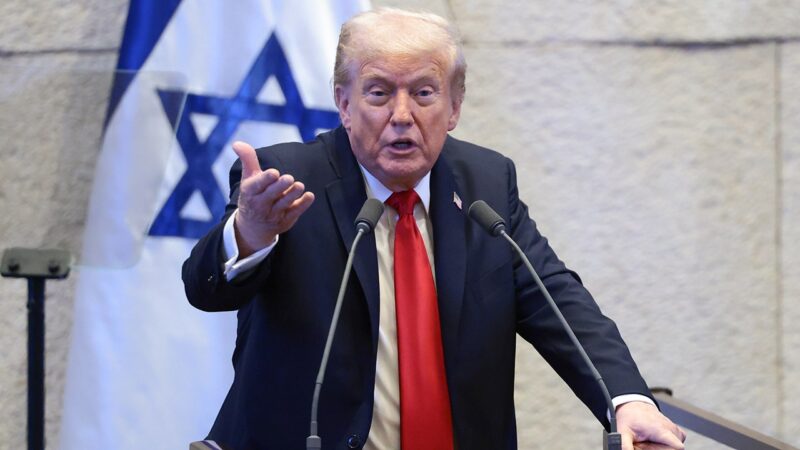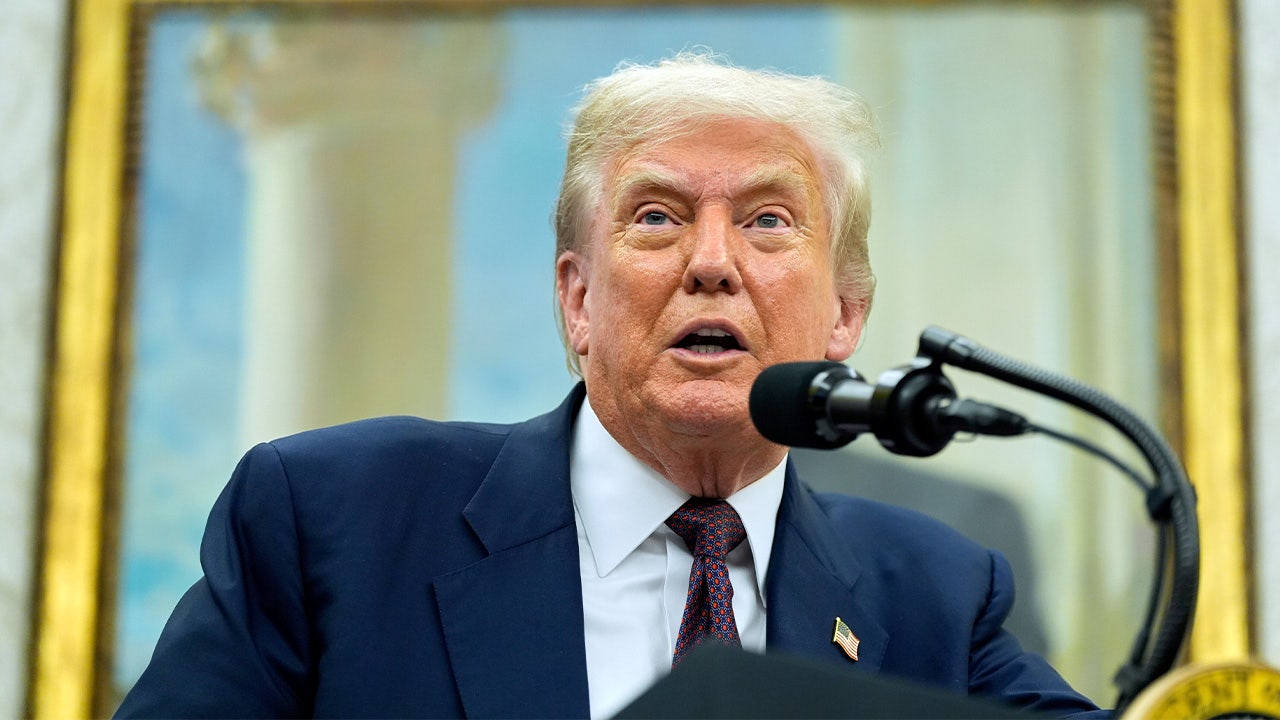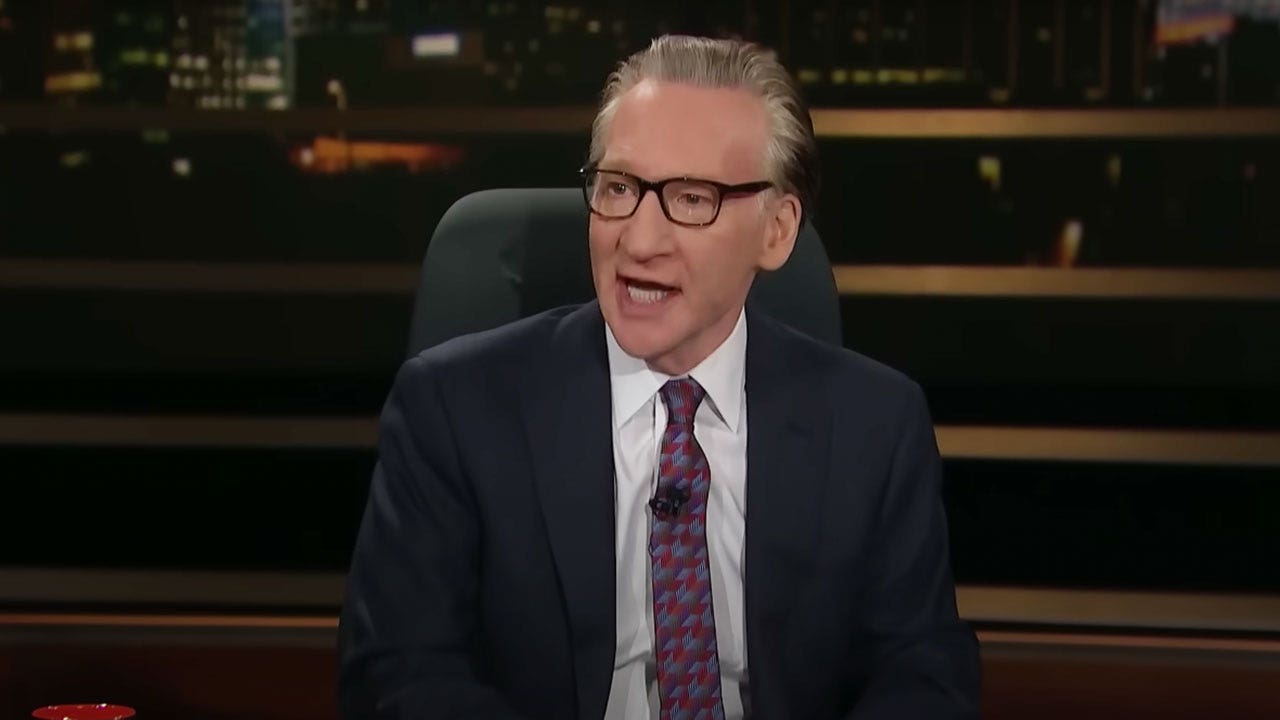NEWYou can now listen to Fox News articles!
Critics once called it isolationist. But national security experts now say Donald Trump’s “America First” strategy is proving to be something else entirely — a hard-nosed policy of deterrence built on strong alliances, especially with Israel.
Fred Fleitz, vice chair of the America First Policy Institute’s Center for American Security and former chief of staff at the National Security Council, told Fox News Digital that “The America First approach to U.S. national security means a strong national security policy, a decisive president, keeping our nation out of unnecessary wars, having members of alliances carry their own weight, but it also means standing strongly with Israel and fighting antisemitism,” Fleitz said.
He said supporting Israel is not about sentiment. “Standing with Israel is in our strategic interest,” he said. “Israel is dealing with enemies in the region that the U.S. would have to deal with if it were not there. So it’s in our strategic interest.”
STATE DEPARTMENT UNVEILS PATRIOTIC ‘AMERICA FIRST’ REBRAND AS PART OF SWEEPING MAKEOVER
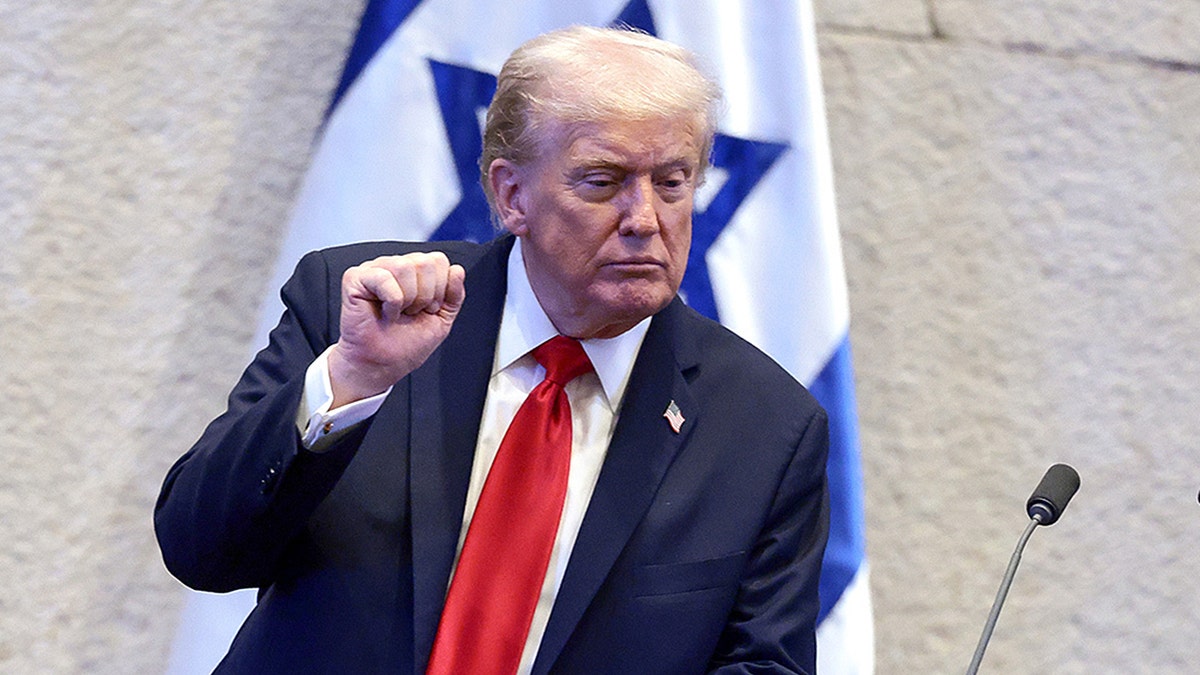
President Donald Trump delivers remarks to the Knesset, Israel’s parliament, on Oct. 13, 2025 in Jerusalem. (Evelyn Hockstein/Pool/Getty Images)
Israel as America’s forward defense
Mike Makovsky, CEO of the Jewish Institute for National Security of America (JINSA), said Israel effectively absorbs threats that would otherwise demand U.S. military action. “Historically, there are about three reasons why we have interests in the region,” he said. “One is Israel. Two is oil. And three is Islamic extremism — terrorism, Shia and Sunni.”
Makovsky said it is ironic that the America First debate has resurfaced “only a few months after Israel smoked America’s Mideast enemies.” He pointed to Iran’s nuclear advances and the role of its proxies. “They’re building ballistic missiles… They could reach the eastern seaboard of the United States,” he said. “You marry missiles with nukes that could hit the U.S. — you’ve got the North Koreans on the West Coast; do you really want Iran that could hit the East Coast?”
According to Makovsky, Israel’s campaign against those threats shows the alliance’s strategic value. “What did the Israelis just do? They took care of it. The United States came in with the B-2 at the very end… but it was Israel that did all that work,” he said.
He added that Israel “pretty much finished off Hamas,” weakened Hezbollah — “which has hundreds of American soldiers’ blood on their hands” — and continues to confront the Houthis to “ensure freedom of navigation.” That, he argued, is deterrence in action: “As long as we support Israel, we give them some help, we give them the weapons they need, they’re really doing our work.”
Countering Iran and its allies
Fleitz called Iran “the biggest threat,” encompassing “Iran and Iran’s proxies in the region. This includes Hamas, Hezbollah in Syria, Iran-backed militias in Iraq, and then Iran itself, with its nuclear weapons program and its sponsorship of terror.”
He said Israel’s actions have “destroyed Hamas proxies and significantly weakened Iran,” adding that “we joined Israel in June in taking on Iran’s nuclear program, which was a threat to global security.”
Both analysts framed Iran as part of a wider axis of power alongside Russia and China, each exploiting Middle East instability to undermine U.S. influence — by fueling proxy wars, spiking energy prices, and threatening trade routes through the Gulf and the Red Sea. Fleitz said Trump’s willingness to act decisively “to attack Iran’s nuclear program” exemplified using strength to prevent costlier wars later.
TRUMP’S IRAN GAMBLE PAYS OFF AS WWIII DOOMSAYERS NOW PRAISE ISRAEL-HAMAS CEASEFIRE
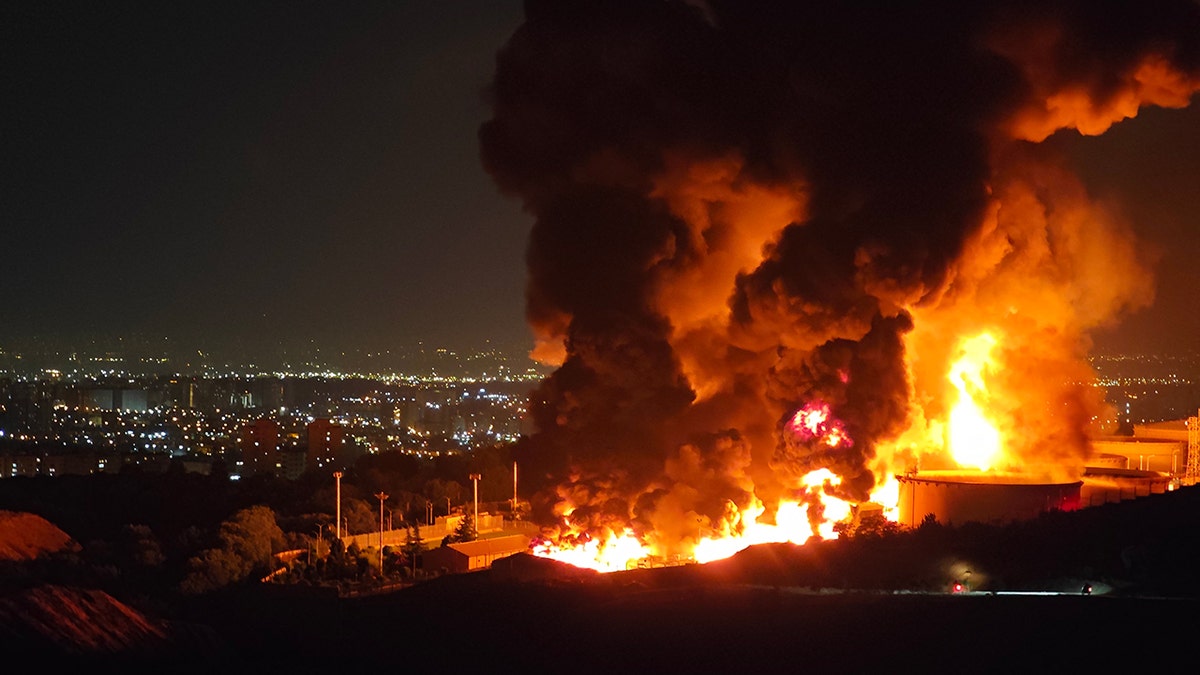
Fire and smoke rise into the sky after an Israeli attack on the Shahran oil depot on June 15, 2025 in Tehran, Iran. Iran’s foreign minister said the country would respond “decisively and proportionally” to a wave of attacks that Israel launched beginning in the early hours of June 13. The attacks targeted multiple military, scientific and residential locations, as well as senior government officials. (Stringer/Getty Images)
Energy and economic security
Both agree that energy policy is where America First becomes measurable. Fleitz said that “energy independence is a very important part of President Trump’s America First policy to free Americans from high energy bills.” At the same time, he noted, energy diplomacy abroad reinforces economic security at home. “By pushing the Saudis — and the Saudis, I think, are happy to help us with this — to produce more oil, it may actually help us end the war in Ukraine,” he said.
Makovsky made a similar case for regional stability: “The biggest threat to the Gulf Arab oil exporters … is Iran,” he said. Without Israel’s containment of Tehran, “Iran would have taken over the Middle East, most likely. And if you care about oil prices, that’s not too good.”
Both experts said that when Israel shoulders the burden of defending energy corridors and trade routes, Americans save in both dollars and deployments.
TRUMP’S GAZA ‘TAKEOVER’ RANKLES AMERICA FIRST CONSERVATIVES, ALLIES SUGGEST NEGOTIATOR-IN-CHIEF IS AT WORK
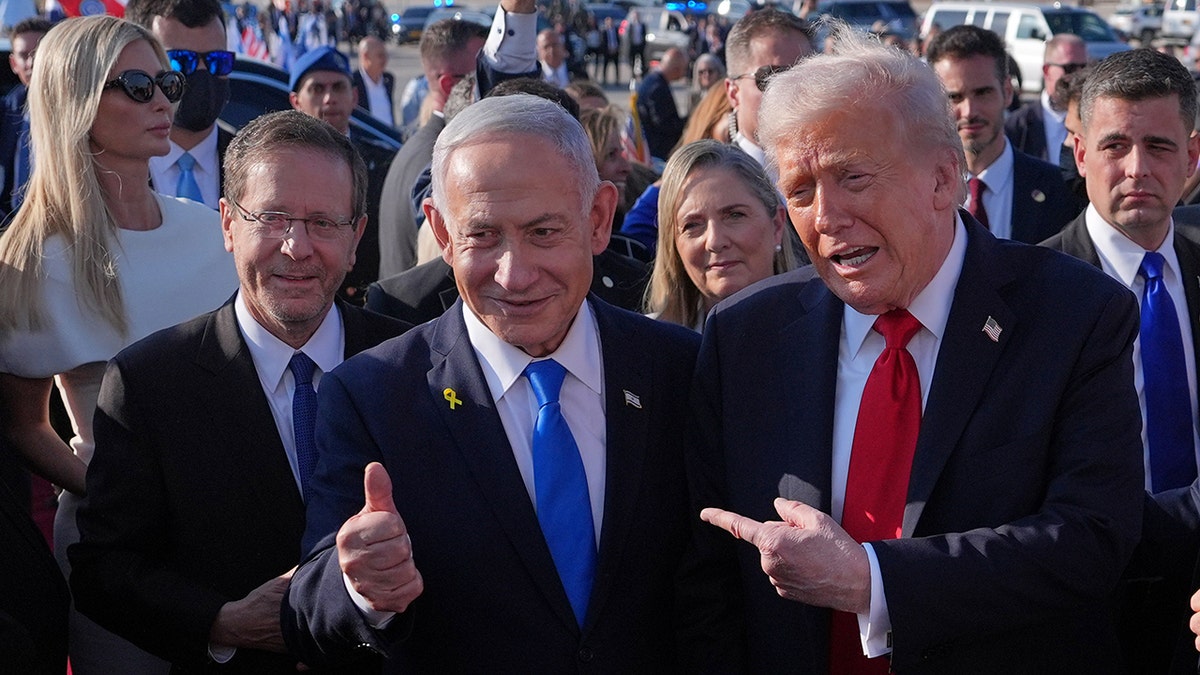
President Donald Trump poses for a photo with Israel’s Prime Minister Benjamin Netanyahu before he boards Air Force One at Ben Gurion International Airport, Monday, Oct. 13, 2025, near Tel Aviv, as Israel’s President Isaac Herzog, left, watches. (Evan Vucci/AP Photo)
Avoiding unnecessary wars
Fleitz said Trump’s doctrine is about selective force, not retreat. “He wants to keep our country out of new and unnecessary wars, but he will use military force prudently to defend our national security,” he said. “He is going to avoid sending American troops into certain situations and using military force. But that doesn’t mean he won’t do these things when it is in U.S. strategic interests.”
He pointed out U.S. personnel who are currently stationed in Israel but “they’re not going to Gaza” and “will not be engaging in combat operations against Hamas.” Their mission, he said, fits the model of minimal footprint, maximum leverage.
Credibility and global deterrence
Makovsky warned that abandoning Israel would erode America’s credibility worldwide. He recalled what a senior Arab leader once told him: “If America doesn’t help Israel attack the nuclear facilities of Iran, it will be one of the great catastrophes.”
“That’s because everybody in the Mideast, everyone in Asia, knows that the U.S.–Israel relationship is one of the closest in the world,” Makovsky said. “If we don’t help Israel, it undercuts our credibility. The Chinese and the Russians and the North Koreans know that if we’re not going to support Israel, we’re not going to help other allies … and it would make us more vulnerable to the Chinese without a doubt.”
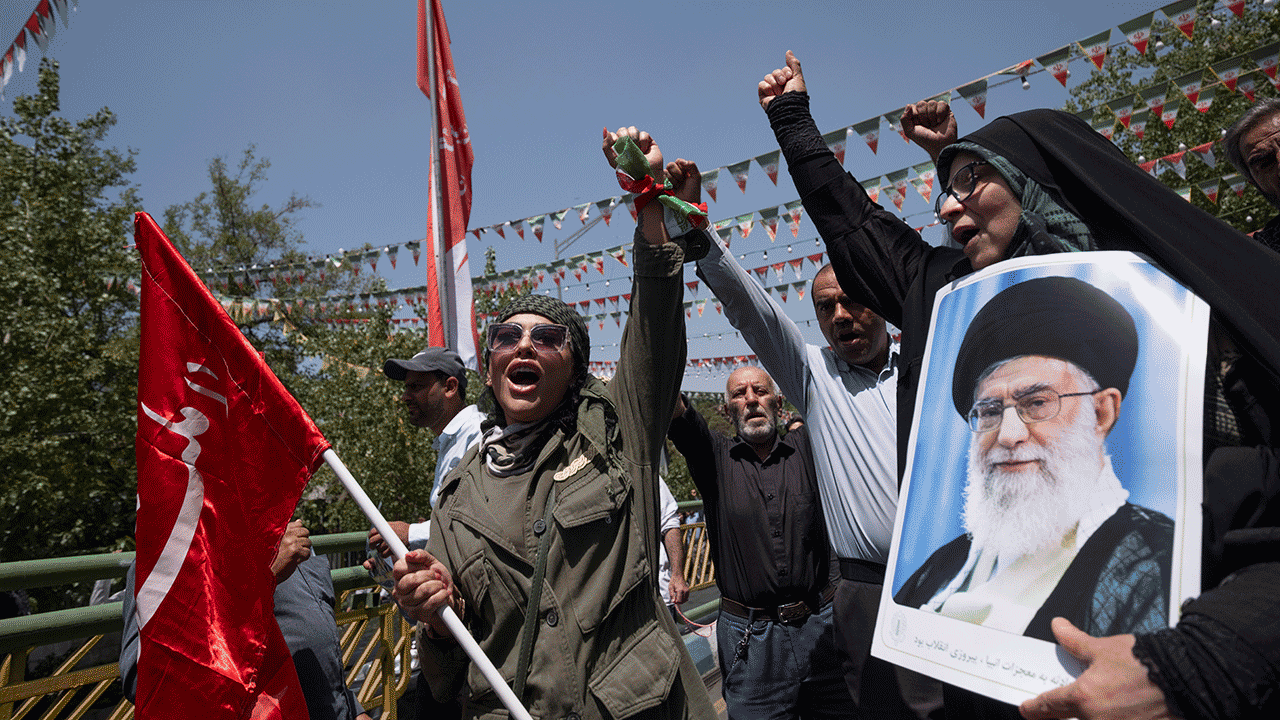
Iranian worshipers shout anti-U.S. and anti-Israeli slogans as one of them holds a portrait of Iran’s Supreme Leader, Ayatollah Ali Khamenei, during an anti-Israeli rally to condemn Israeli attacks on Iran, after Tehran’s Friday prayers in Tehran, Iran, on June 20, 2025. (Photo by Morteza Nikoubazl/NurPhoto via Getty Images)
Peace through strength
Fleitz said Trump’s “20-point peace plan” for Gaza exemplifies the America First balance between toughness and diplomacy. “It achieved its two primary objectives, getting all the living hostages out of Israel and enacting a ceasefire,” he said, acknowledging that “the ceasefire is fairly shaky.” The next step, he added, is “an international stabilization force” — a complex process still under negotiation.
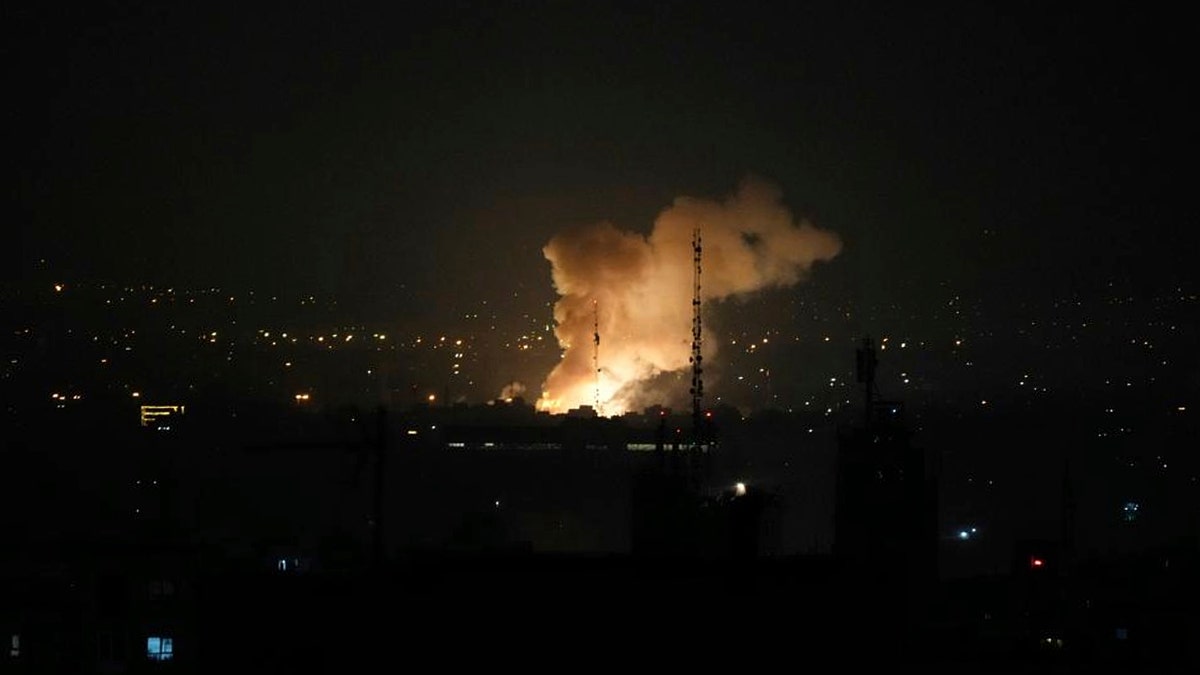
Smoke rises after an explosion in Tehran, Iran, Friday, June 13, 2025. Israel attacked Iran’s capital early Friday, with explosions booming across Tehran. (Getty)
CLICK HERE TO DOWNLOAD THE FOX NEWS APP
For both experts, the takeaway is the same: America First doesn’t mean isolation. It means strategic partnerships that keep U.S. troops out of long wars while preserving American dominance.

